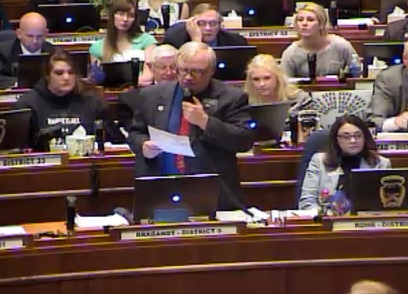House Votes To Make Grand Jury Petitions Tougher

Last year a group of activists got together and gather signature for petitions to empanel a grand jury charged with investigating bribery allegations against Governor Jack Dalrymple. North Dakota state law allows for petitioners to initiate a grand jury with signatures numbering just 10% of the number of people who voted in the gubernatorial race in the last election.
In Dunn, that means just 167 signatures. Clearly, the bar has been set a little too low for this sort of thing. Especially for the sort of specious allegations leveled at Governor Dalrymple, which hold that he’s guilty of bribes for accepting campaign contributions from people he governs. Where I’m from, that’s called democracy, but I digress.
Despite that low threshold, petition collectors haven’t had a lot of luck. The original petition was thrown out by a district court judge (whose decision was upheld by the state Supreme Court) for having unqualified signatures. They’ve since filed a second petition, but the legislature is taking up a law to make those sort of petitions harder to accomplish.
HB1451, which got some fairly heated (and at times hilarious) debate on the floor of the House today, would raise the signature requirement from 10% to 40% of the gubernatorial vote, with a maximum of 5,000 signatures required.
Just to give this some perspective, under current law a petition to empanel a grand jury would require just 44 signatures in Slope County (which, with 443, cast the fewest ballots in the gubernatorial race). Under this new law, that total would go up to 177.
So the least number of signatures needed would be 177. The most anywhere in the state would be 5,000.
Given that this is a seldom-used bit of law, I really don’t see how these changes are all that objectionable. I do believe this peculiar bit of North Dakota law should remain (just six other states have a provision like this), but I also think the threshold for beginning a grand jury investigation should be higher than it is now to protect against the process being abused.
On a related note, Rep. Kim Koppelman talked about some legislators receiving threats over this piece of legislation. I asked some of my legislative friends and they say that’s the first time they’ve heard of anyone being threatened.
The bill passed on a 61-33 vote.







